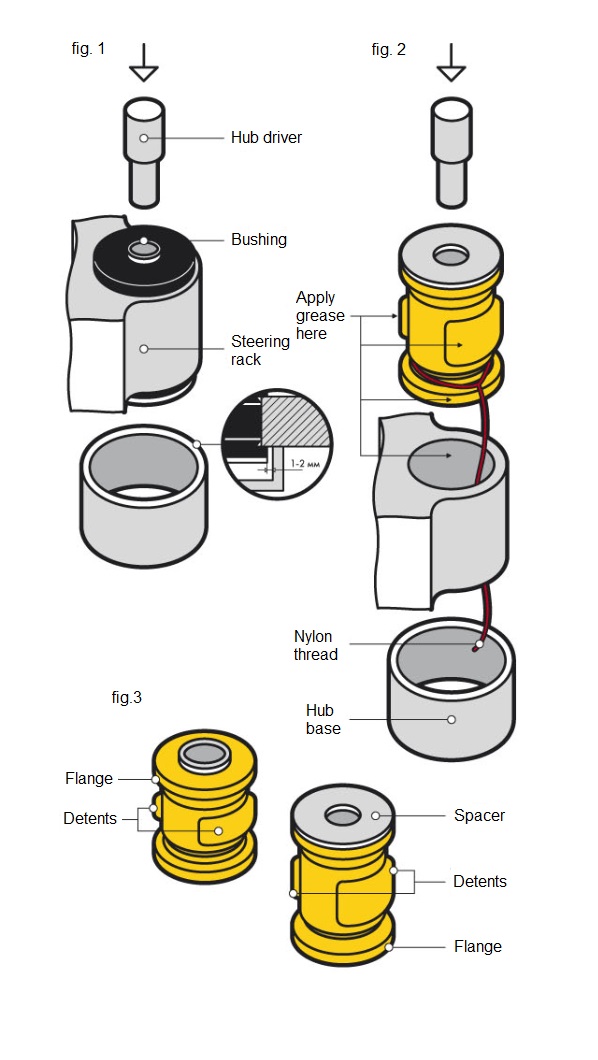Attention! Before starting a work of the removing and installing of the bushings, choose the metal tubings (hub base and hub driver) for the removal and installation for each bushing. Hub base I.D. should be 1-2 mm. bigger than O.D. of the bushing’s flange (fig.3) not to interfere removing of the bushing. O.D. of the hub driver must be the same as O.D. of the inner metal sleeve.While removing, note the positions of big bushing and detents of the bushings. Mark the steering rack for the further correct installation.
Removal
- Place a steering rack upon the hub base into the press.
- Place a hub driver upon the old bushing.
- Press an old bushing out of the rack increasing pressure gradually to avoid a skewness of the hub driver and deformation of the housing bore.
- After the pressing out, inspect the surface of the housing bore of the steering rack, clean, file and polish if any dirt, rust, burr.
Installation
- Lubricate a housing bore in the steering rack and the outer surface of the bushing with supplied grease or any other consistent grease.
- Stretch a loop of the nylon thread under the flange of a big bushing (fig. 2).
- Push a thread through the housing bore of the steering rack.
- Place a bushing in the housing bore. Insert the flange into the housing bore using nylon thread.
- Align detents of the bushing with the marks on the steering rack.
- Place a steering rack upon the hub base into the press.
- Place a hub driver upon the inner metal sleeve of the bushing.
- Start pressing. Increase the load gradually to make bushing spreading evenly until it fills the housing bore completely.
- Initially the bushing may slip into the housing bore slightly skewed because of the difference in diameters of the housing bore and the bushing. Due to the resiliency of the bushing, it’s bigger diameter allows to fill the housing bore completely and fix the bushing properly.
- Straighten the flange using nylon thread.
- Remove nylon thread. Remove excess grease.
- Ensure the symmetry of new bushing’s position and ensure the flanges are tight in the housing bore. If necessary, align the bushing in the housing bore.
- Follow steps 4 through 12 for the small bushing but without nylon thread.
Attention! The tightening force values are specified in the vehicle manufacturer’s documentation.

| Possible problems* *Are not a result of the parts defects and can’t be considered a warranty case | Inner metal sleeve is torn off. | Outer metal shell is torn off. | Elastomer (polyurethane) of the bushing is damaged. | Bushing is not holding in the housing bore. | Bushing with outer metal shell is deformed while installing in the housing bore. |
| Wearout of the stabilizer and / or the arm’s housing bores. | X | ||||
| Housing bore is not cleaned from dust and rust. | X | ||||
| Another parts of suspension are worn out. As a result, the load on bushings is uneven. | X | X | X | ||
| Vehicle was operated in excess of the maximum capacity. | X | X | X | ||
| Outer shell or inner sleeve is not adhered to the polyurethane by design specificity. | X | X | |||
| Vehicle is raised on and the geometry of suspension is broken. | X | X | X | ||
| Bushing has been trimmed or ground. | X | ||||
| Wrong choice of the bushing (incorrect OEM). | X | X | |||
| Sharpened edges of the housing bore were not filed and caused a damage of the bushing during installation. | X | X | |||
| Inappropriate tightening of the parts. | X | ||||
| While new bushing was pressing in, inappropriate hub driver cut the elastomer that has been torn later. | X | ||||
| Bushing was skewed while installing into the housing bore. | X | ||||
| Inappropriate hub driver. Uneven distribution of the press force. | X | ||||
| Housing bore was damaged during removal of the old bushing. | X |


